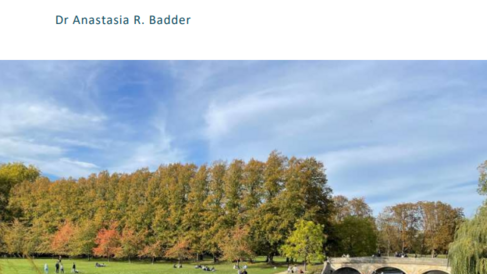
The Cambridge Interfaith Programme has released a report from research carried out as part of the 18-month project Water Efficiency in Faith & Diverse Communities. Funded by the Ofwat Innovation Fund, the research is part of a collaboration with Cambridge Water, South Staffordshire Water, other water industry actors and ecological organisations.
Today, we are also announcing the keynote speaker for the linked conference, Being with Water Otherwise (15 & 16 April 2024).
At the outset, water industry partners wished to learn about how religious communities in Cambridge use and value water, and about community needs in terms of water and sustainability. The approach taken also reflects the Cambridge Interfaith Programme’s concern about how best to bring religion into dialogue with current polycrises (including water shortage and drought), with attention to the potential of religious ways of being to relate to water ‘otherwise’. The ultimate goal of this work has been to explore new possibilities for water conservation and sustainability practices that are inspired by and/or speak to religious ways of being.
While our water industry partners are curious to learn about different religious traditions, for practical reasons it was necessary to focus the fieldwork more specifically. Choosing to engage primarily with interlocutors from Muslim and Jewish communities, CIP sought to balance depth of insight with opportunity for comparison.
From the Executive Summary
“Many people from Cambridge’s faith communities are engaged in environmental activism and sustainability initiatives and would value support with their efforts. Across four months of fieldwork, including focus groups, interviews, and workshops, we found that there was significant mistrust about the motives of the water industry in opening this kind of dialogue. At the same time, our interlocutors often became intrigued and found themselves reflecting in novel ways on how belief might impact their approach to water use.
“The report offers guidance on how different stakeholders—most particularly water industry actors—might interact productively with faith communities, and—as importantly—some missteps to avoid. While the fieldwork reported here was necessarily geographically focused and reflects the particularities of those who entered into these time-limited conversations, we believe that the findings can be of wider relevance, both as fresh knowledge for the partners who commissioned our research and as a starting point for a sustained exploration of the intersections between faith and climate change.
The Research Process
“The research process began with a review of existing anthropological literature around intersections of religion and ecology with a specific focus on water and water sustainability. A fieldwork phase followed, incorporating interviews, participant observation, and workshops intended to invite explicit discussions around sustainability conducted across segments of Cambridge-based Jewish and Muslim communities.
“Initial findings were shared with different project stakeholders, and responses invited from other religious traditions, feeding into the final report. In addition to the research phase, the Cambridge Interfaith Programme is hosting an academic conference (Being with Water Otherwise) in April 2024. Key knowledge from that event will be shared with stakeholders in the Ofwat project, to ensure the continued flow of insight between academic and practical domains.”
Key recommendations
For the water industry
- Learn. When seeking to engage communities characterised by “religion” or “faith”, industry actors have a responsibility to consider and enhance their own religious literacy.
- Be reflexive. Further reflection about who or what is “religious” and/or “cultural” and the work these terms do in industry discourse is needed to avoid othering and marginalising so-called “faith and diverse” water users.
- Avoid generalising. It is important that water companies are aware of and account for diversity within religious communities, if the aim is to produce and implement meaningful sustainability initiatives.
- Listen. Listening is crucial—companies should aim to listen to, take seriously, and learn from users, rather than telling “them” where “they” are failing and what “they” must do.
For all stakeholders
- Collaborate. Water sustainability initiatives should be first and foremost collaborative—those who are most immediately impacted by water interests and issues should be at the centre of the design process.
For researchers, educators and funders
- Contribute. Consider the possibilities and opportunities to design and implement industry-appropriate religious literacy training.
- Continue. This report has identified further opportunities for meaningful research around the intersection of religious communities and water use.
These recommendations are given as part of the executive summary (pages vi–vii). A fuller account is provided on pages 28–29.
Download Dr Anastasia Badder’s full report, Water and/in religious relations: a Cambridge study (PDF).
Announcing our April keynote:
Professor Vanessa Strang
Divine Alternatives: water beings and their transformational potential in human-non-human relations

Veronica is a cultural anthropologist whose work is concerned with human-environmental relations, in particular societies’ engagements with water. She has worked at the Pitt Rivers Museum and Oxford University’s Environmental Change Unit, served as the Chair of the Association of Social Anthropologists of the UK and the Commonwealth, and was awarded an international water prize by UNESCO in 2007. Her latest book is Water Beings: From nature worship to the environmental crisis (Reaktion Books, 2023).
Her Cambridge lecture will draw on findings from a major comparative study of water beings around the world, to illuminate an intriguing pattern of religious transformation. In many larger societies, serpentine water deities were semi-humanised, and then entirely humanised, or displaced by divinities in human form. With the rise of the major monotheisms, ‘Nature’ was alienated and feminised, supreme male Gods appropriated the role of controlling and supplying water and, in the assertion of human dominion, many long-venerated serpent beings were demonised and slain.
Strang proposes that these religious transformations reflect widening inequalities within societies and between human and non-human beings. Today, in personifying and communicating the creative agency of the world’s most vital element, water divinities provide an alternate model: a way to rethink contemporary distributions of power and the way that humankind engages with water and ecosystems.
